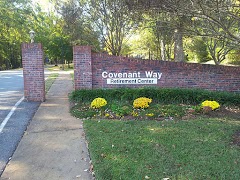 Covenant Way, the nonprofit retirement center in Due West, is continuing operation under a new board of directors. Don Chapman, chairman of the newly elected board, made the following announcement following the first meeting of the board June 3:
Covenant Way, the nonprofit retirement center in Due West, is continuing operation under a new board of directors. Don Chapman, chairman of the newly elected board, made the following announcement following the first meeting of the board June 3:
“We are extremely pleased…that we have reached a tentative agreement with interested parties that will enable us to continue our mission to provide quality retirement services to senior citizens at our facility located in Due West, SC. Services for existing care residents will continue uninterrupted and plans to offer expanded care services are already under way.”
The facility was scheduled to close May 15, but a search for new sponsorship of the facility began with election of a new board in May. In addition to Mr. Chapman, members of the current board are Lee Logan, Bill Lesesne, Bob Clarke, III., and Joe Ellis. Mr. Logan is general manager and Mr. Lesesne assistant general manager.
According to Mr. Chapman’s announcement, “Covenant Way will continue its mission to focus on the needs of the retirement community by providing an array of services for independent and assisted living care residents. Skilled nursing care services will not be offered.”
The announcement pointed out, “Covenant Way has developed a reputation for providing top quality retirement services to its residents in a safe and tranquil environment for over three decades. It has been home for hundreds of residents and we look forward to continuing its traditions, while growing the size of the institution in the days and weeks ahead.”
For further information, write Covenant Way, PO Box 307, Due West, SC 29639, or telephone 864-379-2570, between 9 a.m. and 5 p.m.
This Day in Presbyterian History
Attendance at church courts
As we are now upon the annual season when the various Presbyterian denominations typically meet in General Assembly, the following short post seems quite appropriate. It is taken from an 1836 issue of The Charleston Observer. – archivist.
Attendance and participation in the courts of the Church—those meetings of the Session, the Presbytery and the General Assembly—always involve some level of personal cost and expense for each attendee. For some the cost is greater than for others. This is one reason why the meetings of Presbytery and General Assembly move regularly from one location to another, so that inconveniences are averaged out over time for all the officers of the Court.
All of this is nothing new. There have always been those who questioned the expense, and perhaps not without good reason, each in his own situation. But as you will read, there are also good and compelling answers urging upon Commissioners their full participation at the Courts of the Church.
Question for The Charleston Observer
Mr. Editor—Is it my duty to travel between four and five hundred miles, at an expense of at least fifty dollars [at least a month’s wages in 1836], for the sole purpose of attending Synod, when in all probability its business would be as well conducted without as with my presence? And in so doing I should be necessarily absent from the people of my charge two, if not three Sabbaths?
—A Member of Synod.
Reply—We answer,
- Should every member of Synod conclude from similar premises that it was not his duty to attend, there would be no meeting at the time and place appointed, and of course no business done.
- One member frequently changes the entire complexion of a meeting; and no one has a right to suppose that his presence is a matter of indifference.
- If the member can afford the expense, it will be money well laid out, and if not, his people should aid him. The time occupied in going and returning, may often be profitably employed. The journey may be of advantage to his health. In conference with his brethren he may receive a new impulse in his Christian course, and be better prepared to labor with effect among his people on his return; so that neither he nor they will be losers by his absence.
- When he was set apart to the work of the ministry, he was expected to make many sacrifices for the good of the cause. And if his brethren to whom he has solemnly promised subjection in the Lord, did not regard attendance upon the Judicatories of the Church as important, they would not have exacted an apology or excuse for non-attendance.
- Instances are exceedingly rare that a minister has ever cause to regret the sacrifices which he has made in attending the Judicatories of the Church. On the contrary he most usually feels himself amply repaid for all the sacrifices which it has cost him.
- The present crisis of the Church seems to demand more than ever a full attendance both of Ministers and Elders, cost what it may.
With that last point, keep in mind that in 1836, the Old School/New School debate was raging in the Presbyterian Church, USA, and the momentous split of those two factions came a year later.
[excerpts from The Charleston Observer, vol. 10, no. 39: Sept. 24, 1836]
